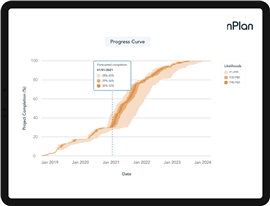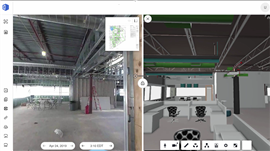Read this article in French German Italian Portuguese Spanish
“Hey ChatGPT, finish this building...” Some of the generative AI tools transforming construction
12 January 2024
2023 was a year when generative AI entered the mainstream, enabling consumers all over the world instantly produce both words and pictures, seemingly as good as those produced by a skilled human. Lucy Barnard finds out how this trend will continue in 2024 and looks at some of the most prominent generative AI tools being used in the construction industry
“Hey ChatGPT, finish this building…” trumpeted a huge billboard on the side of a construction site on the famous Keyserlei shopping street in Antwerp in Belgium last summer.
The advert, for Belgian construction recruitment agency Impact quickly went viral with Impact sharing images via its social media channels.
 An advert for Belgian construction recruitment firm Impact on a construction site in Keyserlei, Antwerp in summer 2023. Image: Impact via Linkedin
An advert for Belgian construction recruitment firm Impact on a construction site in Keyserlei, Antwerp in summer 2023. Image: Impact via Linkedin
“AI can do a lot. But it can’t finish this building on the Keyserlei in Antwerp. AI can’t fix a leak or install a heating system neither [sic],” said Isabelle Dumortier, the company’s director of marketing. “Crafts(wo)men are here to stay, and they deserve to be recognized. Their skills are simply irreplaceable.”
Of course, Dumortier has a point. No AI tool can put together all of the complex tasks necessary to plan, execute and complete a complicated structure like the one shown in Keyserlei.
Nonetheless, the advert went viral precisely because it captured the zeitgeist of 2023 – a year when generative AI entered the mainstream, enabling consumers all over the world instantly produce both words and pictures, seemingly as good as those produced by a skilled human.
And in 2024 this trend is set to continue as companies outside the technology sector adopt generative AI in earnest, using the technology to perform tasks like writing the first drafts of documents or summarising recordings of meetings.
For the construction industry in particular, a series of new generative AI tools aims to make work quicker, more efficient and safer.
Hundreds of generative AI tools have been developed for a range of construction-related applications across the world, helping construction professionals log construction progress, check for discrepancies, keep up to date with schedules and ensure better site safety.
The Construction Briefing had a quick look at a few of the most prominent:
Civils.ai
Singapore-based Civils.ai is a civil engineering focused software-as-a-service (SaaS) tool that applies a large language model (LLM) to help reduce the time it takes to search for information in construction project documents. Initially users must upload PDF documents such as site reports, contracts or design codes to the platform. The tool then processes the information so that it can generate answers to specific questions posed by users relating to the project.
Civils.ai launched in January 2022. It uses the same technology that powers ChatGPT but has been fine-tuned for the industry allowing users to turn construction reports and data from projects into a format that the LLM can understand. The model also uses publicly available geological data to create Minecraft-esque environments in which engineers can simulate and run calculations on their construction projects.
The company says that the most frequently asked questions from users include asking the model to identify residual risks that haven’t been addressed in the design documents or asking who is responsible for certain tasks, for example installing pipes or windows.
Civils.ai can either be embedded into other construction software or be used separately. It currently has an existing partnership with Procore. It says that in 2024 it will continue to pursue integration partners including a ChatGPT interface. The company is also working to improve accuracy by fine-tuning its models to be reliable for pre-1980s PDFs which can be too blurry for the model to be easily able to upload.
“In 2023 Civils.ai used generative AI to create a framework in which all the data on a construction project - everything from text and tables through to drawings - can be held and searched to complete a user’s tasks,” says Mirko Vairo, chief operating officer.
“In 2024 civils.ai will begin using this framework to create specific AI agents which can help to automate various tasks which which humans struggle. These agents will be designed to help with tasks on construction projects. This can include tasks like answering questions, giving status updates, change control and even checking files against sets of rules defined by the user. The possibilities of AI agents in automating tasks is endless and as the frontiers of data science and artificial intelligence continue to extend further the end power and performance of these agents is unknown, but we are certain it will make for an exciting future for the industry.”
Barry (nPlan)
Barry is the name given to the chatbot which UK-based construction software company nPlan started using in May 2023. The company specializes in analysing large volumes of historical construction data and using machine learning software to provide unbiased predictions for how long construction schedules will last. The company’s clients include Shell and Skanska.
 a typical nPlan progress curve. Image: nPlan
a typical nPlan progress curve. Image: nPlan
The company has developed its own LLM specializing in infrastructure, construction and engineering, ICE-LM, that has been trained on engineering, scheduling, project management and contracting data.
At the company’s recent AI Day in December, chief technology officer, Alan Mosca said that since the company launched Barry it has also uploaded RICS industry standards to the tool in order to ensure that Barry’s recommendations were in line with industry best practice.
He said that over the coming year the company plans to start rolling out new features which will enable Barry to produce rough schedules from just inputting text, or to upload schedules in order to generate multiple alternative live schedule plans.
“One example could be if the schedule starts to slip,” Mosca says. “Barry could suggest multiple different ways to get things back on track, with a costed-out scenario for each. Barry will be able to create a report showing the two different scenarios and provide conclusions on which one would be better which it can then put in an email and send it to stakeholders.”
“Every construction professional knows that the best time to make a change to a project is the first day you think about it,” he says. “Barry can do all the things you would do to generate new scenarios, such as talk to engineers and find a planner to modify the schedule. It might not be perfect but good enough to describe the change and much much faster.”
A tech company which was founded in Poland in 2020 and is currently based in Austin, Texas, AI Clearing helps businesses track how work is progressing on major construction and infrastructure projects by analysing data captured from drones, a mobile app used by onsite workers and using AI to compare that with construction project designs and schedules.
The tool then crunches all of this data to provide automated daily progress updates so managers can tell at the touch of a button how many cubic meters of concrete have been poured on one night and how that aligns with the schedule. The tool can also detect discrepancies, delays and budget overruns at an early stage.
In July 2023, the company announced a partnership with Oracle Industry Lab, allowing it to integrate with the mobile applications of Oracle Primavera P6 Enterprise Portfolio Management. Since then, AI Clearing has been busy pulling the schedule from Oracle Primavera P6 into AI Clearing and linking schedule activities with the scopes of work in the model, providing a link between schedules and actual activity. The companies are now working on integrating AI Clearing with other Oracle products such as Oracle Primavera Unifier in order to help validate payments to contractors as soon as work is completed.
CerebrumX
 Sumit Chauhan, co-founder of CerebrumX. Image: CerebrumX
Sumit Chauhan, co-founder of CerebrumX. Image: CerebrumX
Michigan-based CerebrumX was founded in 2020. It works with OEMs and fleet managers to operate a platform that collects, integrates and analyses real data from more than 15 million vehicles. The company says that it can use this live real-time data for a range of tasks: to improve driver safety by remotely monitoring vehicle health and performance and providing roadside assistance before drivers even call to request it; to proactively schedule maintenance routines; and even to work out the best places to EV charging points based on the battery life of the vehicles it monitors.
One of the company’s key features is that it enables construction fleet managers to integrate data from modern OEM-installed telematics systems with data collected from older machines via a “dongle” hardware device.
“We believe that companies in the construction industry will continue to leverage AI and machine learning technology to further advance and enhance their entire operations,” Sumit Chauhan, CerebrumX co-founder, told Construction Technology. “With more electric vehicles being utilized by construction vehicle fleets, AI will provide the necessary telematics and connected data to help fleet managers operate these vehicles efficiently, as well as utilize the data to realize the most optimal time for recharge.”
Wint
Israeli start-up Wint.ai uses AI to detect and stop water leaks. Founded in Israel in 2011, Wint has developed a water management system comprising AI-enabled software and connected hardware that alerts users when there may be a leak.
The machine learning tool learns the use of water and can then detect anomalies. The start-up’s smart water device is placed in pipe systems where it can monitor and analyse water useage.
On a building site, this means that if WINT detects that water usage has increased suddenly in the middle of the night when it is normally very low, it will send a message to site security. If no one responds immediately then the system will automatically shut off the flow of water, protecting job sites from costly and time consuming damage.
In August 2023, Wint announced that it had raised US$35m from a Series C financing round, which the company said would be used to epand its global footprint in key markets in the US, UK, Israel and the EU.
Saifety.ai
Abu Dhabi-based Saifety.ai is a machine learning-enabled, multi-lingual chatbot. The cloud-based platform which launched in earnest in 2020, enables staff to log safety observations in real time, automate safety inspections and provide workers with real-time safety information. The app is now available in Procore. In July 2023, Saifety.ai’s parent company Navatech Group, alongside South African safety visualisation specialist Jincom announced it had been awarded a contract by Saudi megaproject Neom to create an intelligent delivery system for safety content via a chatbot.
OpenSpace
 Real life data from an OpenSpace camera compared with a digital design using BIM. Image: OpenSpace
Real life data from an OpenSpace camera compared with a digital design using BIM. Image: OpenSpace
California-based OpenSpace.ai launched in 2018. The tool works by mounting a small 360-degree camera onto builders’ hardhats. This captures an image of a construction site as they walk around a building site. OpenSpace’s software then digitises these real-life images creating a virtual version, rather like a time-stamped Google street view of a job site. The tool is then able to compare the real life data with a digital model of the site. This makes it possible for the tool to keep track of construction progress, spot discrepancies and calculate exactly how much of each element of construction work has been completed.
STAY CONNECTED



Receive the information you need when you need it through our world-leading magazines, newsletters and daily briefings.
CONNECT WITH THE TEAM










